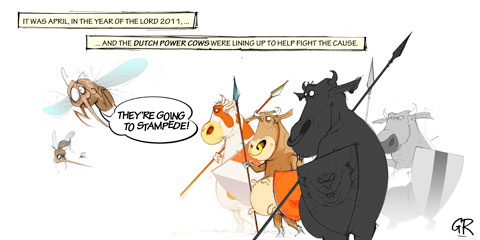The Dutch Power Cows are stampeding again — this time it’s to help rid the world of malaria. You too can become a power cow, if your PC is fast enough.
It turns out you can help cure diseases, make scientific discoveries and help change the world into a better place by literally doing nothing on your computer, if, that is, you’ve donated your PC’s idle time to a global Distributed Computing (DC) project.
DC is a way to divide a large problem that requires lots of processing power into smaller tasks that can be solved by larger numbers of computers. Basically, some projects require enormous amounts of computing power, but by using software like BOINC (Berkeley Open Infrastructure of Network Computing), users contribute by letting their PCs process small data packages.
The Dutch Power Cows (DPC) is a Dutch DC team that organises annual ‘stampedes’ every April. Throughout the year, DPC members donate their CPU power to projects of their choice, but during the stampede efforts are made to divert all computing power to a single project. This year that project is Malaria Control (MC).
Several tech-savvy TU Delft student groups are getting in on the stampeding action. EEMCS MSc student Jetze Schaafsma started the DelftInHetHuis account and lobbied for others to join, eventually getting over 30 users with 60 computers to participate. Consequently, DelftInHetHuis became the second-largest DPC producer and at that time the overall world producer for MC.
Martin Ganeff, an aerospace MSc student, decided to join the computing project independently: “When I joined, I wasn’t really aware there were subteams competing against each other; I just wanted to be part of the project that might eventually help wipe out malaria.”
According to Schaafsma, the 2011 stampede is likely to receive more attention than previous years because it’s not about physics or math but rather about a cause directly pertaining to human health. However, the end result of malaria research isn’t the only incentive for the hundreds of participants affiliated with the Power Cows. “Part of the motivation is the challenge of winning a game and the sense of community when taking on the challenge as a group,” says Schaafsma. “With a single machine your contribution can get lost in a mass, but in a combined effort you get the feeling of being on a winning team, and that’s what really motivates people to go all-out.”
The Dutch aren’t the only ones organizing distributed computing stampedes. As the DC community grows, DC enthusiasts around the world are uniting into teams by geographical region and organising their own stampedes: they vote for a certain cause and then divert all their idle CPU time to it. The MC project, for example, is getting an extra computing boost this year because a Norwegian team dedicated its annual Easter stampede to it. So literally anyone can organize a team and coordinate a DC stampede for a good cause.
Tudasa, the TU Delft African Student Association, will host a special ‘African Cultural Movie Evening & Debate’ on June 3 at TU Delft’s Cultural Centre. Tudasa, whose seventy members are university students from some thirteen countries across Africa, was recently founded with the aim of fostering friendship, sharing cultures and generating greater understanding between the university’s African, Dutch and other international student communities.
Following the African cultural movie, a debate will be held focusing on some of the key issues facing Africa today. “The goal of this evening is to help African students integrate with Dutch students and show those in attendance something of the African film industry, while also helping to raise awareness of some of the challenges in Africa today”, says Jean Charles Nyabusore, Tudasa’s public relations spokesman.
This intriguing cultural evening begins at 18:30 with drinks and the chance to socialize before the featured film begins at 19:00. After the film ends, more drinks and the debate will follow, with all those in attendance invited to participate. The entry fee is 3 euros per person, which includes a free drink and snacks. This cultural evening and debate is expected to end around midnight.



Comments are closed.